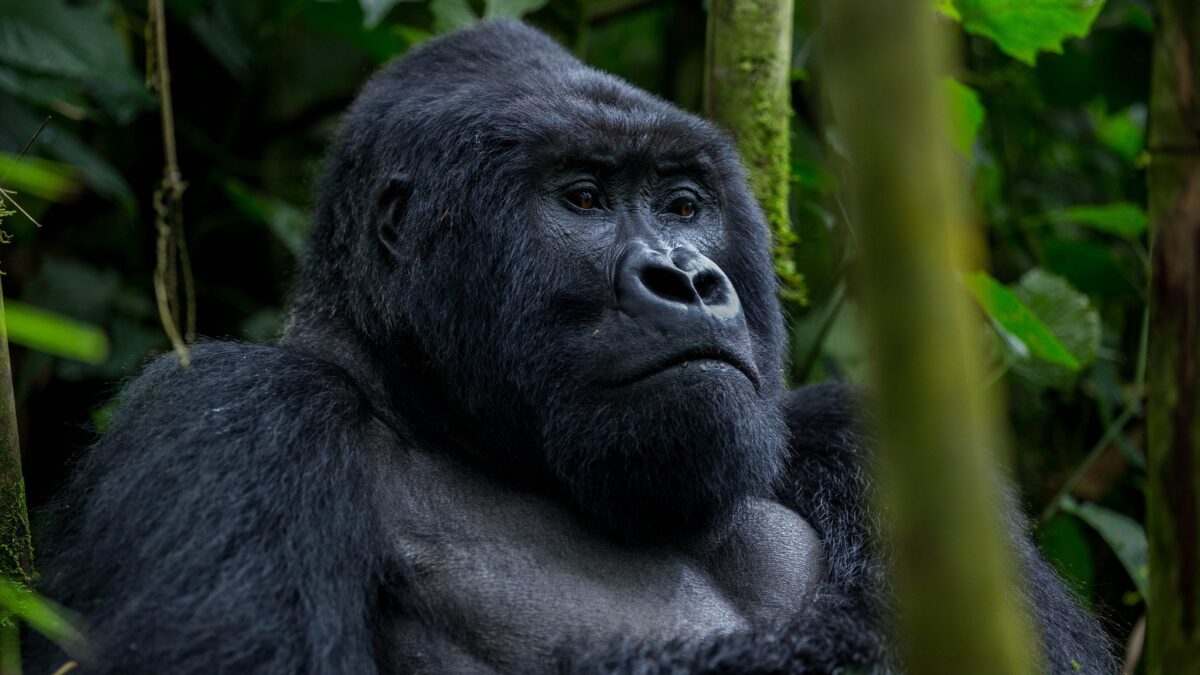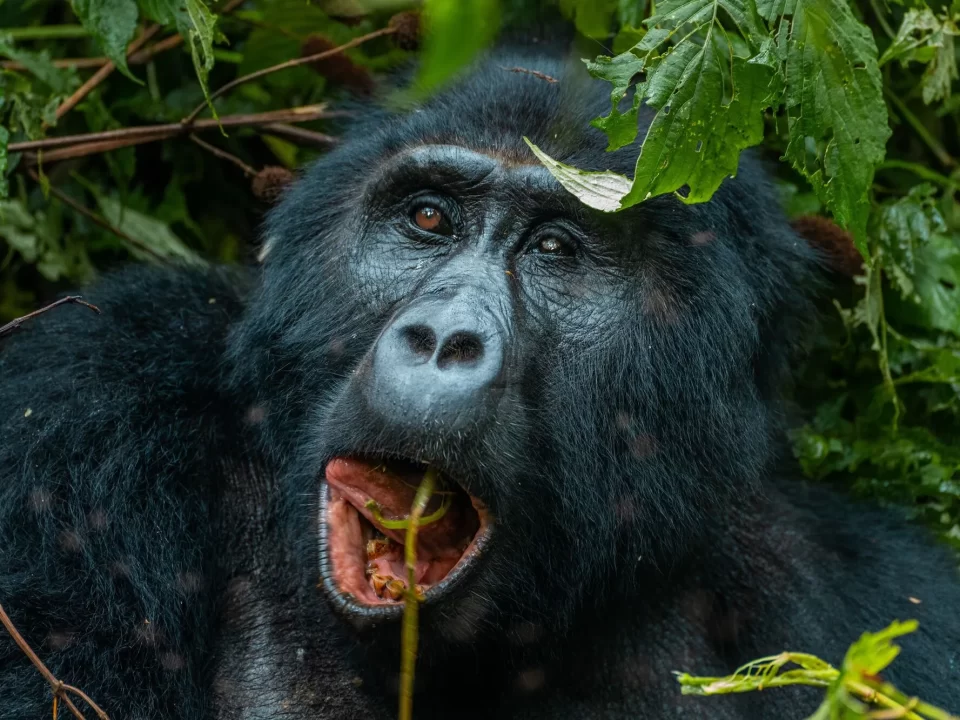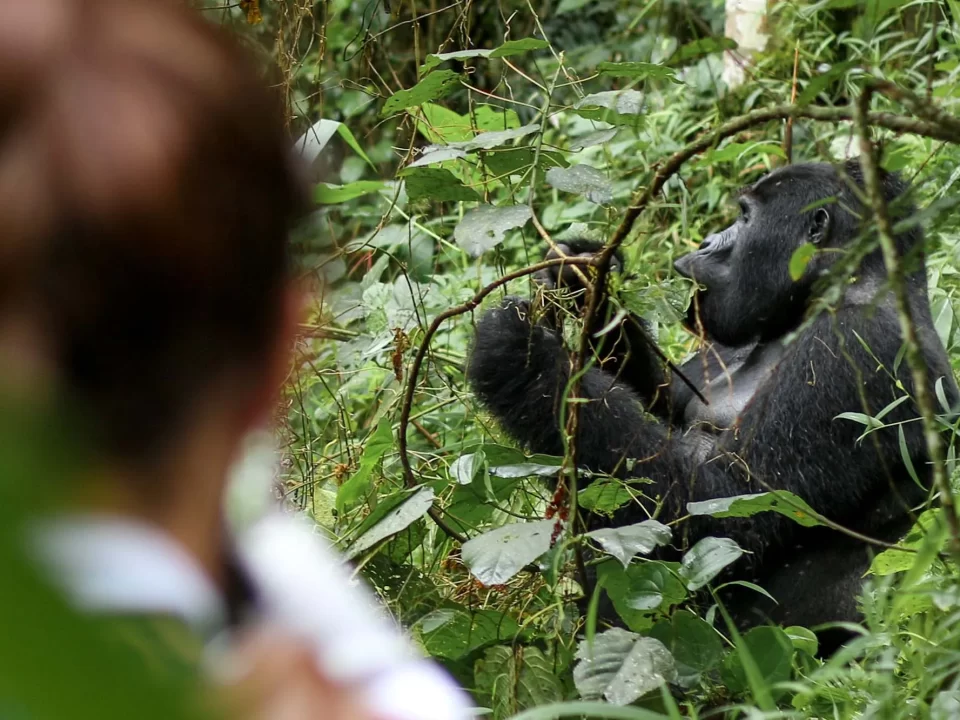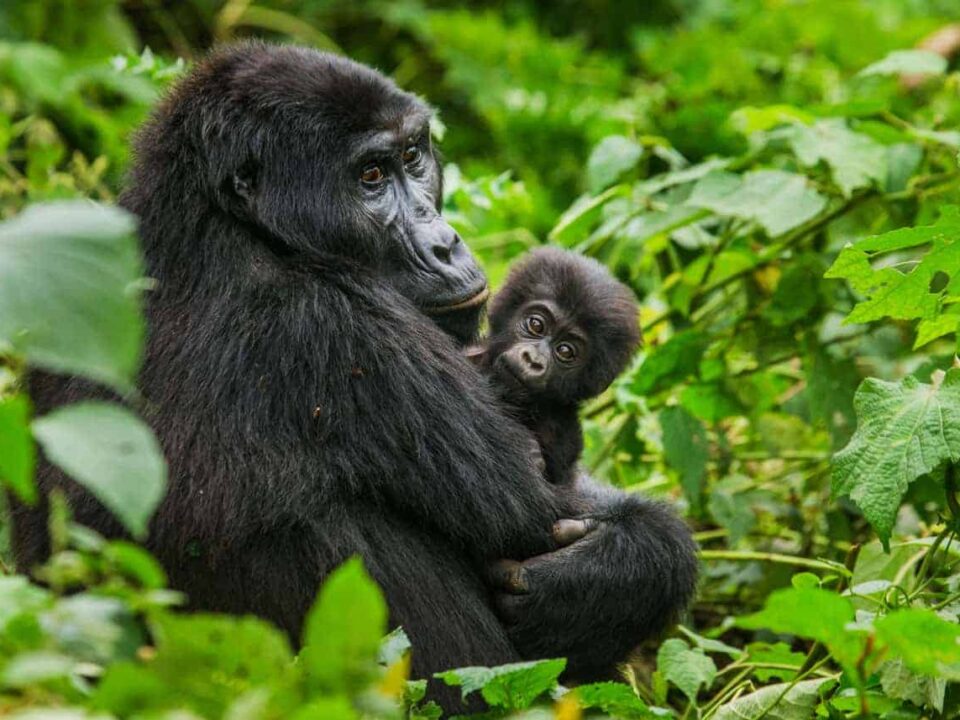
A Guide to Visiting Bonobos in the Congo
April 7, 2025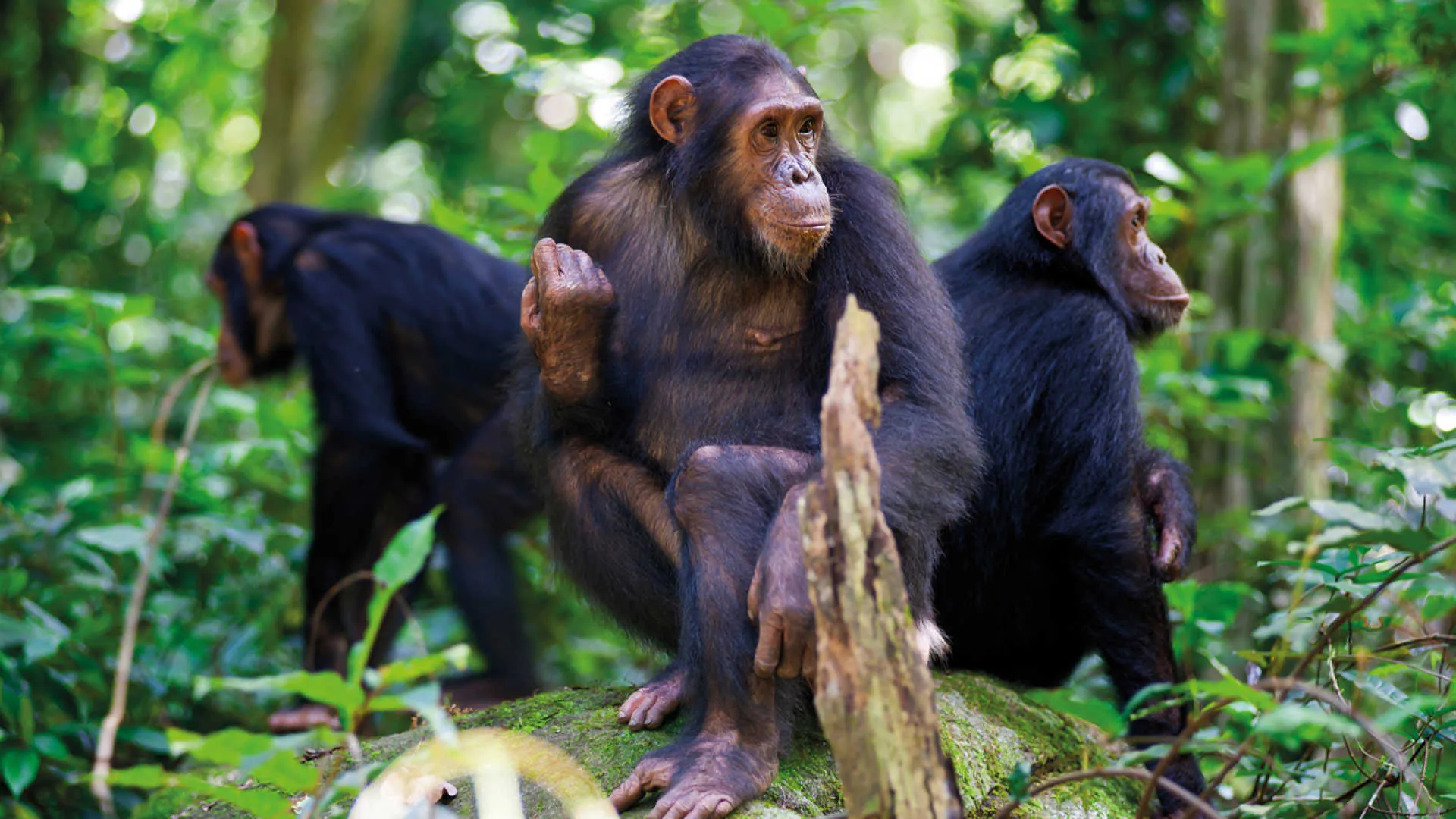
How Challenging Is Chimpanzee Trekking in Nyungwe Forest?
April 8, 2025Gorilla Trekking Costs in Uganda & Rwanda for 2025 – 2026
Gorilla Trekking Costs in Uganda & Rwanda for 2025 – 2026 — Gorilla trekking is undoubtedly one of the most awe-inspiring wildlife experiences you can have. If you’re planning a trip to see mountain gorillas in Uganda or Rwanda, understanding the costs involved is essential for a well-planned adventure. From permits to lodging and transportation, we’ll guide you through the key expenses of a gorilla trekking journey in 2025, so you can budget accordingly.
2025 – 2026 Gorilla Trekking Permit Prices
Uganda:
A standard gorilla trekking permit in Uganda costs $800 per person for an unforgettable trek into Bwindi Impenetrable National Park. For a deeper and more immersive experience, Uganda offers the Gorilla Habituation Experience, which allows you to spend up to four hours with the gorillas for $1,500 per person.
Rwanda:
In Rwanda, trekking permits for Volcanoes National Park are priced at $1,500 per person. This fee grants you one hour with the gorillas in their natural habitat.
While the permit is a key expense, there are other elements to factor into the total cost of your trip.
Total Cost of a Gorilla Trekking Safari
The overall cost of a 5-day gorilla trekking safari varies greatly depending on accommodation choices and transportation preferences. Here’s an approximate breakdown:
In Uganda:
For a 5-day safari, you can expect to pay between $2,400 and $4,500 per person, depending on whether you choose mid-range or luxury lodging.
In Rwanda:
A similar 5-day safari in Rwanda could cost between $3,500 and $7,000 per person due to higher lodging and service costs in the country.
Key Factors That Influence Cost
Several factors will impact your total expenditure on a gorilla trekking trip. Let’s explore each of these components in detail:
Accommodation:
-
Budget Lodges: Around $100 per night
-
Mid-range Lodges: Between $150–$400 per night
-
Luxury Lodges: $400+ per night
Transportation:
-
Private 4×4 Safari Vehicles: $150–$250 per day
-
Domestic Flights to Bwindi (Uganda): About $540 for a round-trip
Additional Costs:
-
Visas: Typically between $50–$100, depending on your nationality
-
Porter Fees: About $20 per trek (optional but highly recommended)
-
Meals: Expect to spend $10–$40 per meal, depending on where you dine
-
Optional Activities: Costs for cultural tours, nature walks, and other experiences will be additional.
In the following sections, we’ll dive deeper into each of these cost elements, giving you a clearer idea of what to expect during your gorilla trekking adventure.
Detailed Budget Breakdown for Gorilla Trekking
When planning your gorilla trekking budget, the permit fee will be your largest expense, but it’s important to consider all other costs as well. Here’s how to plan based on your preferences:
Gorilla Trekking in Uganda (Costs Overview)
-
Permit: $800 per person
-
Accommodation:
-
Budget options: From $100 per night
-
Mid-range options: $150–$400 per night
-
Luxury options: $400+ per night
-
-
Transportation: Private vehicle rental at $150–$250 per day
-
Additional Costs: Meals, visas, and optional porter services
For a 5-day safari in Uganda, the total cost will range between $2,400 and $4,500 per person, depending on your choice of accommodation and travel style.
Gorilla Trekking in Rwanda (Costs Overview)
-
Permit: $1,500 per person
-
Accommodation:
-
Budget options: Around $150 per night
-
Mid-range options: $300–$500 per night
-
Luxury options: $500+ per night
-
-
Transportation: Private vehicle or domestic flights (around $540 round-trip to Volcanoes National Park)
-
Additional Costs: Similar to Uganda, you’ll need to account for meals, visas, and optional activities.
For a 5-day safari in Rwanda, you can expect to pay anywhere from $3,500 to $7,000+ per person, depending on your lodging choices and other factors.
Tour Operator vs. DIY: What’s Best for Your Gorilla Trek?
While organizing a gorilla trekking trip on your own is possible, many travelers prefer to book through a tour operator for convenience and ease. A reputable tour operator can assist with everything from booking permits and accommodations to arranging transportation, ensuring a smoother, more enjoyable experience. They also offer expert-guided treks, which enhance your overall safari.
If you prefer a more flexible and cost-effective approach, a DIY trip might work for you—but it requires thorough research, preparation, and coordination.
Quick Budgeting Takeaways for Your Gorilla Trek
-
Uganda’s gorilla permit costs $800, while Rwanda’s permit costs $1,500, making Uganda the more affordable choice for many trekkers.
-
Your total budget will depend on factors like your choice of accommodation, transportation, meals, and additional activities.
-
Booking through a tour operator simplifies the planning process and ensures a seamless experience, but if you’re up for the challenge, a DIY approach offers flexibility and potential cost savings.
Gorilla Habituation Experience Permit (Exclusive to Uganda)
For those seeking a truly unique and immersive gorilla trekking adventure, Uganda offers the Gorilla Habituation Experience. This exclusive permit lets you spend up to four hours with a gorilla family that is in the process of habituation, allowing them to gradually get used to human presence. The cost for this incredible experience is $1,500 per person.
Tips for Booking Your Gorilla Habituation Permit:
-
Book in Advance: Gorilla permits are in high demand and tend to sell out quickly, especially during peak travel seasons. To secure your preferred date and trekking location, it’s advisable to book 3 to 6 months ahead of time.
-
Flexibility Can Help: If your travel dates are flexible, you might have a better chance of finding available permits, particularly during less busy months.
-
Use a Tour Operator: Tour operators often have access to permits that may not be directly available to independent travelers. They can also manage the logistics of your booking, ensuring a hassle-free experience from start to finish.
Gorilla Safari Accommodation Costs
The type of accommodation you choose will significantly influence the cost of your gorilla safari in both Uganda and Rwanda. Whether you’re on a budget or looking for a lavish experience, both countries offer a wide variety of options to suit different preferences and financial plans.
Uganda Accommodation Options
-
Budget Lodges (From $100 per night): For travelers looking to keep costs low, Uganda offers a variety of budget-friendly options like guesthouses and lodges. Starting around $100 per night, these accommodations typically provide basic comforts like clean rooms and hearty meals.
-
Mid-Range Lodges ($150-$400 per night): These lodges strike a balance between cost and comfort. Expect amenities like swimming pools, Wi-Fi, and upgraded rooms. Many of these lodges offer stunning views of the surrounding forests or mountains, creating the perfect retreat after a day of trekking.
-
Luxury Lodges ($400+ per night): For those seeking a more indulgent experience, Uganda offers luxury accommodations that can cost anywhere from $400 to over $1,500 per night. These lodges feature private villas or suites, gourmet dining, and personalized services for a truly lavish experience.
-
Campsites and Homestays ($10-$60 per night): For the most budget-conscious travelers, campsites (starting at $10 per night) and homestays (from $20 per night) provide an authentic and immersive experience, allowing you to connect with the local culture and nature.
Rwanda Accommodation Options
-
Mid-Range Lodges ($300-$600 per night): Rwanda, known for its high-end tourism, offers fewer budget options. However, mid-range lodges priced between $300 and $600 per night still offer a comfortable stay with modern amenities and a balance of affordability.
-
Luxury Lodges and Eco-Resorts ($800+ per night): Rwanda is home to some of Africa’s most exclusive and luxurious eco-lodges. Prices typically start at $800 per night and can exceed $3,000 for premium options. These lodges offer exceptional service, world-class amenities, and spectacular views of the volcanic terrain.
Factors Influencing Accommodation Costs
Several factors will affect the price of your accommodation during a gorilla trekking safari:
-
Location: Lodges that are closer to the trek trailheads are typically more expensive due to their proximity to the gorilla trekking experience.
-
Amenities: Lodges with additional amenities like pools, spas, and wellness centers tend to have higher rates.
-
Level of Luxury: Naturally, the cost increases significantly as you move from budget options to mid-range, and especially to luxury lodges.
-
Season: During peak seasons (June-September, December-February), demand is high, and accommodation rates are often inflated.
Accommodation Recommendations
-
In Uganda:
-
Nkuringo Bwindi Gorilla Lodge (mid-range & luxury)
-
Buhoma Lodge (luxury)
-
Bwindi Lodge (luxury)
-
Mahogany Springs Lodge (mid-range)
-
Ichumbi Gorilla Lodge (budget-friendly)
-
-
In Rwanda:
-
Sabyinyo Silverback Lodge (luxury)
-
Bisate Lodge (luxury)
-
Mountain Gorilla View Lodge (mid-range)
-
Virunga Lodge (mid-range)
-
Le Bambou Gorilla Lodge (budget-friendly)
-
Gorilla Trekking Transportation Costs: How to Get to Your Adventure
When planning your gorilla trekking safari in Uganda or Rwanda, transportation plays a big role in your overall budget. Whether you’re traveling between national parks or just getting to the starting point of your trek, here’s a breakdown of the transportation options and costs in both countries.
Ground Transportation Options
-
Private Car Hire (Uganda & Rwanda):
For the most comfort and flexibility, hiring a private safari car is the best option. This is especially ideal for groups or travelers who prefer a more personalized experience. A private car hire generally costs between $150 and $250 per day, which includes the cost of fuel and a driver-guide who will also offer insights along the way. It’s a great way to enjoy the journey while having expert knowledge at your disposal. -
Rental Car (Uganda & Rwanda):
If you enjoy driving and prefer independence, renting a car gives you the freedom to explore at your own pace. Rental prices vary from $60 to $150 per day, depending on the vehicle and rental company. Fuel costs are approximately $1.20 per liter (as of 2024), and you’ll need to be prepared for challenging road conditions, especially on the less-developed roads near the national parks. -
Public Transport (Uganda):
Though not commonly used for gorilla trekking, public buses and shared taxis (matatus) offer a budget-friendly way to get to some locations. However, public transport can be time-consuming and uncomfortable, especially for longer distances, and may not offer the convenience or speed required for your gorilla trek.
Flights and Transfer Costs
-
Domestic Flights (Uganda):
For travelers pressed for time or those looking to avoid long drives, domestic flights are available from Entebbe International Airport (EBB) to smaller airstrips near Bwindi Impenetrable National Park. These flights typically cost around $540 per person for a round-trip ticket. Upon arrival at the airstrip, you’ll need a private transfer to your lodge, which can cost anywhere from $50 to $250 per person. -
Airport Transfers (Uganda & Rwanda):
Many lodges and tour operators offer airport transfers as part of their service packages, or they can be added for an extra fee. Airport transfers usually involve comfortable 4×4 vehicles, and prices typically range from $100 to $250 per transfer, depending on the distance from the airport to your lodge or the park entrance.
Comparing Accessibility: Rwanda vs. Uganda
-
Rwanda:
Kigali International Airport (KGL) is the more accessible gateway for travelers heading to gorilla trekking destinations. It’s about a 2-hour drive to Volcanoes National Park and just a 3-hour drive to the Ugandan border, with an additional 2 hours to Bwindi Impenetrable National Park. -
Uganda:
While Entebbe International Airport (EBB) is well-connected internationally, it’s farther from the trekking locations. Traveling from Entebbe to Bwindi typically requires an 11-hour drive or a 1-hour domestic flight followed by another 2-hour drive to your lodge.
Choosing the Right Transportation for Your Trip
Your choice of transport will depend on factors such as your budget, time constraints, and personal preferences. If time and comfort are priorities, opting for domestic flights and private transfers will provide the most seamless experience. On the other hand, if you’re traveling on a budget, rental cars or public transport may work, but be prepared for a longer, less comfortable journey.
No matter what option you choose, make sure to factor in transportation costs when planning your gorilla trekking adventure. After all, getting there is part of the experience!
Additional Costs to Consider for Your Gorilla Trekking Adventure
Beyond the main expenses like permits, accommodation, and transportation, there are several other costs to keep in mind when planning your gorilla trekking experience in Uganda or Rwanda. These additional expenses can vary based on your preferences and activities, so it’s important to plan accordingly for a smooth, financially prepared journey.
Visas
-
Uganda:
Most international visitors will need a visa to enter Uganda. A single-entry tourist visa, valid for 60 days, costs $50 and can be obtained online. -
Rwanda:
Rwanda follows a similar visa policy. A single-entry tourist visa, also valid for 60 days, costs $50 and can be applied for online as well. -
East Africa Tourist Visa:
If you plan to visit both Uganda and Rwanda during your trip, the East Africa Tourist Visa might be the best option. It allows multiple entries between the three East African countries (Uganda, Rwanda, and Kenya) and costs $100.
Meals and Drinks
-
Meals Not Included:
While many lodges and tour packages include meals, you’ll likely have to pay for meals outside of your lodge or for additional snacks and beverages. Budget approximately $10–$20 per meal at local restaurants, and around $5–$15 for drinks. -
Meals at Lodges or Hotels:
In more upscale lodges or hotels, meals tend to be more expensive. Expect to pay about $20–$40 per meal for lunch or dinner at these establishments. -
Snacks and Drinks:
For your trek, packing snacks and a reusable water bottle is a smart way to save on extra costs while on the trail.
Porter Fees
Hiring a porter is highly recommended during your gorilla trek. Porters, often local community members, assist with carrying your backpack and offer support on the sometimes challenging terrain. The cost for a porter is typically around $20 per trek.
Additional Activities
-
Batwa Community Visits (Uganda):
Immerse yourself in the rich cultural history of the Batwa people, the indigenous forest dwellers of Bwindi Impenetrable National Park. A visit to their village usually costs $50 and includes a guided tour, traditional dance performances, and storytelling. -
Cultural Performances:
Many lodges host cultural performances, showcasing local traditional music and dance. These performances are sometimes included in your lodge activities or available for a small fee. -
Guided Nature Walks:
Explore the diverse ecosystems of the national parks with a guided nature walk, generally priced between $30 and $100 per person. -
Birdwatching:
Both Uganda and Rwanda offer exceptional birdwatching opportunities. Guided birdwatching tours typically range from $50 to $150 per person.
Tipping
Tipping is customary in both Uganda and Rwanda, though not mandatory. It’s a great way to show appreciation for excellent service. A general tipping guideline is:
-
Guides and Drivers: $10–$20 per day
-
Other Lodge Staff: $5–$10 per day
Other Expenses
Remember to budget for additional personal expenses such as souvenirs, travel insurance, and any miscellaneous items you might need during your trip.
Gorilla Trekking Tour Packages: What’s Included
Gorilla trekking tour packages are designed to offer a hassle-free experience, allowing you to enjoy every aspect of your adventure without having to worry about the logistics. These packages typically cover all the essentials, so you can focus on the incredible wildlife encounter awaiting you. Here’s a breakdown of what you can expect to be included in most gorilla trekking tour packages.
What’s Included in Your Gorilla Trekking Tour Package:
-
Gorilla Permit(s):
The most important aspect of any gorilla trekking trip is the gorilla trekking permit, which allows you to trek into the jungle to see the gorillas. This permit is often included in the package price, ensuring you have everything you need for your trek. -
Accommodation:
Your package will usually include accommodation in comfortable lodges or hotels near the gorilla trekking starting points. This allows you to relax and unwind after a day of trekking, and many accommodations are set in beautiful natural surroundings. -
Transportation:
Ground transportation is typically covered in your package. This includes transfers between the airport, your lodge, and the trekking locations. Some packages may also offer domestic flights if needed, especially in Uganda for flights to Bwindi or in Rwanda for flights to Volcanoes National Park. -
Meals:
Most packages offer full-board meals, which typically include breakfast, lunch, and dinner. This ensures you are well-nourished and ready for your trek each day, with meals often prepared using fresh local ingredients. -
Guides and Rangers:
Knowledgeable guides and park rangers will accompany you during your gorilla trek, ensuring a safe and enriching experience. These experts will share valuable insights into gorilla behavior, the surrounding ecosystem, and conservation efforts. -
Park Entrance Fees:
The package generally includes park entrance fees, which cover your access to the national parks where the gorillas live. These fees go toward the conservation of the park and its wildlife, including the endangered gorillas. -
Other Activities:
Many tour packages offer additional activities, such as nature walks, cultural visits, or boat rides, enhancing your experience and giving you the opportunity to immerse yourself in the local culture and environment.
Why Choose Trek Africa Expeditions for Your Gorilla Trekking Safari/Tour
Trek Africa Expeditions offers comprehensive and customizable gorilla trekking safari packages designed to provide an unforgettable experience. Here’s why you should consider booking your adventure with them:
-
Expert Knowledge: Trek Africa Expeditions has experienced guides and rangers who are experts in wildlife and local ecosystems, ensuring you receive the best experience and insights throughout your journey.
-
Tailored Itineraries: Whether you’re looking for a short trek or an extended adventure, Trek Africa Expeditions can design a package that fits your schedule, budget, and preferences, ensuring a personalized and unforgettable experience.
-
Seamless Travel: From airport transfers to lodge bookings, all logistics are handled, leaving you with the peace of mind to focus on the adventure itself.
-
Authentic Cultural Experiences: Trek Africa Expeditions goes beyond just gorilla trekking. They offer opportunities to immerse yourself in local culture, visiting communities like the Batwa in Uganda and engaging in cultural performances and village tours.
-
Top-Quality Accommodations: Whether you’re staying in budget-friendly lodges or indulging in luxury accommodations, you can expect high-quality service and comfort in every lodge booked by Trek Africa Expeditions.
-
Sustainable and Responsible Travel: Trek Africa Expeditions is committed to sustainable tourism practices, ensuring that your trip supports local communities and contributes to wildlife conservation efforts.
Choosing the right tour operator makes all the difference in creating a memorable and hassle-free gorilla trekking experience. Trek Africa Expeditions offers all the essentials, plus the flexibility to tailor your experience, making it a top choice for travelers seeking an exceptional gorilla safari adventure.

